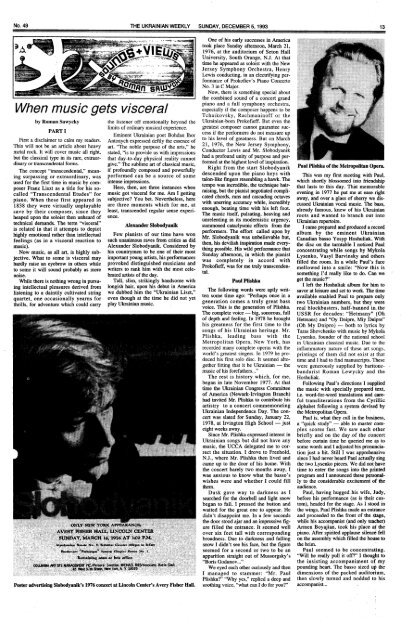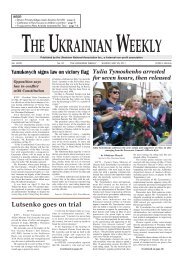The Ukrainian Weekly 1993
The Ukrainian Weekly 1993
The Ukrainian Weekly 1993
You also want an ePaper? Increase the reach of your titles
YUMPU automatically turns print PDFs into web optimized ePapers that Google loves.
No. 49 THE UKRAINIAN WEEKLY SUNDAY, DECEMBER 5,<strong>1993</strong> 13When music gets visceralby Roman SawyckyPARTIFirst a disclaimer to calm my readers.This will not be an article about heavymetal rock. It will cover music all right,but the classical type in its rare, extraordinaryor transcendental forms.<strong>The</strong> concept "transcendental," meaningsurpassing or extraordinary, wasused for the first time in music by composerFranz Liszt as a title for his socalled"Transcendental Etudes" forpiano. When these first appeared in1838 they were virtually unplayablesave by their composer, since theyheaped upon the soloist then unheard oftechnical demands. <strong>The</strong> term "visceral"is related in that it attempts to depicthighly emotional rather than intellectualfeelings (as in a visceral reaction tomusic).Now music, as all art, is highly subjective.What to some is visceral mayhardly raise an eyebrow in others whileto some it will sound probably as merenoise.While there is nothing wrong in pursuingintellectual pleasures derived fromlistening to a daintily cultivated stringquartet, one occasionally yearns forthrills, for adventure which could carrythe listener off emotionally beyond thelimits of ordinary musical experience.Eminent <strong>Ukrainian</strong> poet Bohdan IhorAntonych expressed deftly the essence ofart. "<strong>The</strong> noble puфose of the arts," hestated, "is to provide us with impressionsthat day-to-day physical reality cannotgive." <strong>The</strong> sublime art of classical music,if profoundly composed and powerfullyperformed can be a source of someintense impressions.Here, then, are three instances whenmusic got visceral for me. Am I gettingsubjective? You bet. Nevertheless, hereare three moments which for me, atleast, transcended regular sense experience.Alexander SlobodyanikFew pianists of our time have wonsuch unanimous raves from critics as didAlexander Slobodyanik. Considered byhis countrymen to be one of their mostimportant young artists, his performancesprovoked distinguished musicians andwriters to rank him with the most celebratedartists of the day.Tall, slim, strikingly handsome withlongish hair, upon his debut in Americawe dubbed him the "<strong>Ukrainian</strong> Liszt,"even though at the time he did not yetplay <strong>Ukrainian</strong> music.Poster advertising Slobodyanik's 1976 concert at Lincoln Center's Avery Fisher Hall.One of his early successes in Americatook place Sunday afternoon, March 21,1976, at the auditorium of Seton HallUniversity, South Orange, N.J. At thattime he appeared as soloist with the NewJersey Symphony Orchestra, HenryLewis conducting, in an electrifying performanceof Prokofiev's Piano ConcertoNo. 3 in C Major.Now, there is something special aboutthe combined sound of a concert grandpiano and a full symphony orchestra,especially if the composer happens to beTchaikovsky, Rachmaninoff or the<strong>Ukrainian</strong>-bom Prokofieff. But even thegreatest composer cannot guarantee successif the performers do not measure upto his level of greatness. But on March21, 1976, the New Jersey Symphony,Conductor Lewis and Mr. Slobodyanikhad a profound unity of purpose and performedat the highest level of inspiration.Right from the start Slobodyanikdescended upon the piano keys withtalon-like fingersresembling a hawk. <strong>The</strong>tempo was incredible, the technique hairraising,but the pianist negotiated complicatedchords, runs and cascading octaveswith unerring accuracy while, incrediblyenough, beating time with his left foot.<strong>The</strong> music itself, pulsating, heaving andunrelenting in its modernistic urgency,summoned cataclysmic effects from theperformers. <strong>The</strong> effort called upon byMr. Slobodyanik was unbelievable but,then, his devilish inspiration made everythingpossible. His wild performance thatSunday afternoon, in which the pianistwas completely in accord withProkofieflF, was for me truly transcendental.PaulPlishka<strong>The</strong> following words were aptly writtensome time ago: "Perhaps once in ageneration comes a truly great bassvoice. This is the generation of Plishka.<strong>The</strong> complete voice — big, sonorous, fullof depth and feeling. In 1978 he broughthis greatness for the first time to thesongs of his <strong>Ukrainian</strong> heritage. Mr.Plishka, leading bass with theMetropolitan Opera, New York, hasrecorded many complete operas with theworld's greatest singers. In 1979 he producedhis first solo disc. It seemed altogetherfitting that it be <strong>Ukrainian</strong> — themusic of his forefathers..."<strong>The</strong> rest is history which, for me,began in late November 1977. At thattime the <strong>Ukrainian</strong> Congress Conunitteeof America (Newark-Irvington Branch)had invited Mr. Plishka to contribute hisartistry to a concert commemorating<strong>Ukrainian</strong> Independence Day. <strong>The</strong> concertwas slated for Sunday, January 22,1978, at Irvington High School — justeight weeks away.Since Mr. Plishka expressed interest in<strong>Ukrainian</strong> songs but did not have anymusic, the UCCA delegated me to correctthe situation. I drove to Freehold,N.J., where Mr. Plishka then lived andcame up to the door of his home. Withthe concert barely two months away, Iwas anxious to laiow what the basso'swishes were and whether I could fillthem.Dusk gave way to darkness as Isearched for the doorbell and light snowbegan to fall. I pressed the button andwaited for the great one to appear. Hedidn't disappoint me. In a few secondsthe door stood ajar and an impressive figurefilled the entrance. It seemed wellover six feet tall with correspondingbroadness. Due to darkness and fallingsnow I didn't see his face, but the figureseemed for a second or two to be anapparition straight out of Mussorgsky's"Boris Godunov..."We eyed each other curiously and thenI managed to stammer: "Mr. PaulPlishka?" "Why yes," replied a deep andsoothing voice, "what can I do for you?"Paul Plishka of the Metropolitan Opera.This was my first meeting with Paul,which shortly blossomed into friendshipthat lasts to this day. That memorableevening in 1977 he put me at ease rightaway, and over a glass of sherry we discussed<strong>Ukrainian</strong> vocal music. <strong>The</strong> bass,already famous, knew of his <strong>Ukrainian</strong>roots and wanted to branch out into<strong>Ukrainian</strong> repertoire.I came prepared and produced a recordalbum by the eminent <strong>Ukrainian</strong>Canadian basso Yosyp Hoshuliak.. Withthe disc on the turntable I noticed Paulconcentrating while songs by MykolaLysenko, Vasyl Barvinsky and othersfilled the room. In a while Paul's facemellowed into a smile: "Now this issomething I'd really like to do. Can weget the music?"I left the Hoshuliak album for him tosavor at leisure and set to work. <strong>The</strong> timeavailable enabled Paul to prepare onlytwo <strong>Ukrainian</strong> numbers, but Шеу werereal blockbusters, half-banned in^theUSSR for decades: "Hetmany'^' (OhHetmans) and "Oy Dnipre, Miy Dnipre"(Oh My Dnipro) — both to lyrics byTaras Shevchenko with music by MykolaLysenko, founder of the national schoolin <strong>Ukrainian</strong> classical music. Due to theinflammatory nature of these art songs,printings of them did not exist at thattime and I had to find manuscripts. <strong>The</strong>sewere generously supplied by baritonebanduristRoman Lewycky and theHoshuliak.Following Paul's dkections I suppliedthe music with specially prepared text,i.e. word-for-word translations and carefultransliterations from the Cyrillicalphabet following a system devised bythe Metropolitan Opera.Paul is, what they call in the business,a "quick study" — able to master complexscores fast. We saw each otherbriefly and on the day of the concertbefore curtain time he queried me as tosome words and I adjusted his pronunciationjust a bit. Still I was apprehensivesince I had never heard Paul actually singthe two Lysenko pieces. We did not havetime to enter the songs into the printedprogram and I announced these personallyto the considerable excitement of Aeaudience.Paul, having hugged his wife, Judy,before his performance (as is their custom),headed for the stage. As I stood inthe wings, Paul Plishka made an entranceand proceeded to the front of the stage,while his accompanist (and only teacher)Armen Boyajian, took his place at thepiano. After spirited applause silence fellon the assembly which filled the house tothe brim.Paul seemed to be concentrating."Will he really pull it off?" I thou^t tothe insisting accompaniment of mypounding heart. <strong>The</strong> basso sized up thedimensions of the packed auditorium,then slowly turned and nodded to hisaccompanist...
















